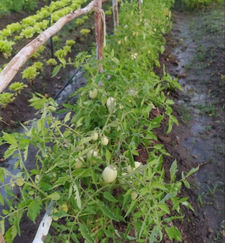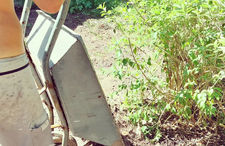Troca de Mudas
Revolução Alimentar
A ONG Pachamama tem muita alegria de levar junto a @chaski.agroecologia o projeto Troca de Mudas - em que a comunidade encontra no espaço urbano um ponto de encontro de saberes sobre hortas comunitárias, agroecologia, cuidado da Terra e redes de apoio para cultivos e cuidado de sementes.

Troca de Mudas já passou o marco de 19 edições e incentiva que todos os assistentes troquem solidariamente mudas adequadas para seu ambiente local, dando e recebendo suporte para que as pequenas plantas floresçam realmente. Nesse vídeo vemos o exímio trabalho de nosso companheiro no caminho da sustentabilidade através de hortas afetivas. Celebramos cada semente na terra dessas terras de Aracaju. Viva as hortas urbanas e comunitárias!
Food Revolution
"Defending life in its diversity"
Vandana Shiva
Life manifests itself with the deep creativity of this land. From her we
harvest diverse, colorful, tasty fruits that feed a solidary network as
a source of refined energy, of life. Join to that source, recovering the
roots that have always been giving nutrition to this planet, is to
reconnect with the intimacy of the creation.
We face huge chains that imprison life from that essence, from seeds
and production methods, a network that consumes poisons and desertifies
productive soils. We found genetically modified foods at our table, in our
daily lives.
And where does the food come from?
Do we know how to manage, plant and harvest?
Do we know them?
The ONG Pachamama sensibilizes to protect and rescue the values connect to the EARTH, has as one of services areas, projects that link to the so call Food Revolution, so combating since of Green Revolution and today masking by the Green Economy/ Green Capitalism. Why the Food Revolution is essential?
-
We are taking the risk to remain without food or without them diversity (a variety into the species is fundamental for a food security);
-
The corporation dominate the food, so that is need to the food consume come from family and traditional farming;
-
There is an imminent devastating action by transgenics, the patenting of crops and the use of agrotoxic.
To help bring about a paradigm shift, we align ourselves on four fronts of action:
a) Sowing sustainable agricultural systems, such as Agroforestry
Our first Agroforestry was implemented in one of the movement's Peasant Communities (Nhanderu’ete) in 2012 and has several agricultural crops combined with forestry. With this new production model, food production is valued, preserved and cultivated since the Pachamama Biodiversity (as opposed to monoculture).
Today gardens and agroforestry are a reality in all community spaces of the Nación Pachamama Movement, which seeks to combine planting, caring for the land, food sovereignty with education. This is the case of the Project called "Quintal-Escola Intihuatana", of the Collective House Intihuatana which is located in Sabiaguaba, Fortaleza - Brazil. Within this, it is intended to improve the crops to which we are already dedicated, such as vegetable garden, spiral of herbs, agroforestry, creation of chickens and native Jandaíra bees, poetic gardening, and integrate them to offer teachings permeated by the beauty of the Andean Mystique.
"Our yard is bigger than the world, we plant seeds of love for Pachamama" Casa Coletiva Intihuatana
Urban Agriculture Course in partnership with Chaski Hortas Urbanas at Campesina Santuário Nhanderu’ete Community
Minga Day - Fruit tree planting in Nhanderu’ete agroforestry
GET TO KNOW OUR PEASANT COMMUNITIES
b) Social empowerment in food cultivation
In the Peasant Communities of the Nación Pachamama Movement, vegetable gardens are cultivated, developed and experimented by the hands of brothers and sisters (who may or may not know how to deal with the Earth), so spaces have been created for learning and working in the management and cultivation of food. Our communities are living laboratories, in which we experience in the practice everything we dream for the world.
Along with this, it is encouraged that Nación Pachamama activists spread throughout Brazil and the world, using the laws of encourage urban agriculture in their cities, occupy spaces for the creation of community vegetable gardens in order to promote food sovereignty, the resignification of contact with food and impacting collective relations with the residents involved in community care, in addition to filling the concrete with green.
c) Respect and Protection of Creole Seeds
Around the 1960s, with the so-called Green Revolution, there was intense work on the part of large multinationals, the media, and with the support of the institutional apparatus of technicians and agricultural engineers who provided the service to discourage the use of Creole seeds that would be replaced by transgenic seeds, together with the belief that greater productivity would be achieved through the use of chemical fertilizers, pesticides and the use of “genetically improved” seeds. Today it is already visible and known that everything was just a big move in which few win and many lose, culminating in a cycle of dependence in which farmers are increasingly dependent on the chemicals produced by these multinationals, in addition to an immense chain of destruction contaminating and poisoning all forms of life on earth.
Since the beginning of our journey as a collective and institution, we have worked to encourage the formation of banks of native seeds to store, sow, exchange and plant, and among all communities we make this exchange of cultures and knowledge, also strengthening the national networks that maintain the tradition care and natural, agroecological cultivation, such as the Creole Seed Fairs that are increasingly strengthened.
Of all the Creole seeds to those of Guarani corn, Avaty-ete and Abatí are the most abundant.
We also cultivate and rescue the arrowroot culture from extinction. Arrowroot is a very rich root and food that, according to Empaer social extension worker, Elicinéia Fortes, the reason for the extinction would be the entry of other starches, such as wheat, corn and especially cassava, often sold as if it were arrowroot. Originating in the tropical regions of South America, the arrowroot has leaves that can reach up to 30 centimeters in length and has a white starch root. Starch source easily absorbed by the organism, the arrowroot was initially used by the indigenous people, which was copied by the colonizers. However, cultivation has lost ground in the past 50 years.
d) Awareness of organic food consumption
Throughout the geography of Nación Pachamama, we encourage the planting and consumption of healthy foods. We believe in a harmonious relationship with animals and, in addition to vegetable gardens, we also develop the cultivation of bees and the creation of chickens taking into account the care among all so that food is the fruit of the loving offers of life at its natural pace.
Twice a year, at the March and September equinoxes, in the 21-day Practice, we carry out a detox and guide all practitioners who consume food free of pesticides and full of prana - Discover the 21-Day Practice.
In addition, the NGO Pachamama supports the Association of the Taquari Project in Campina Grande do Sul and encourages, among many activities offered by the Association, the production of agroecological food in community spaces with family farming and encourages the environmental education of the population when carrying out the Green Exchange Project, where recyclable materials are exchanged for food produced by female farmers in the community gardens.
Get to know this Community Vegetable Garden Project and understand the social and environmental benefits of encouraging community planting.
See the recent article about the Community Gardens of the Taquari Project.
Ecosocialism in the community experience
Just as the air, the sun, the water, the earth belong to everyone and for all, the bees grown in the peasant communities of the Nación Pachamama Movement provide a service to all humanity, we all benefit when someone is willing to take care of them and preserve them!
SUPPORT THE INITIATIVE AND DONATE A HONEY BOX!!
TO KNOW MORE ABOUT THE APIARY IMPLEMENTATION PROJECT
IN THE CASAMAMAMA RAINBOW COMMUNITY

"Nosso quintal é maior do que o mundo, plantamos sementes de amor à Pachamama" Casa Coletiva Intiwatana:
Curso de Agricultura Urbana em parceria com Chaski Hortas Urbanas na Comunidade Campesina Santuário Nhanderu’ete:
b) Empoderamento social no cultivo dos alimentos
Nas Comunidades Campesinas do Movimento Nación Pachamama, hortas são cultivadas, desenvolvidas e experimentadas pelas mãos de hermanos e hermanas (que conhecem ou não a lida com a Terra), por isso foram criados espaços para aprendizado e trabalho no manejo e cultivo de alimentos. Nossas comunidades são laboratórios vivos, em que experienciamos na prática tudo o que sonhamos para o mundo.
Junto a isso, incentiva-se que os ativistas da Nación Pachamama espalhados em todo o Brasil e mundo, valendo-se das leis de incentivo à agricultura urbana em suas cidades, ocupem espaços para criação de hortas comunitárias a fim de promover a soberania alimentar, a ressignificação do contato com o alimento e impactando nas relações coletivas com os moradores envolvidos no cuidado comunitário, além de preencher o concreto com verde.
c) Respeito e Proteção das Sementes Crioulas
Por volta dos anos 60, com a chamada Revolução Verde, houve um intenso trabalho por parte de grandes multinacionais, da mídia e com o apoio do aparato institucional de técnicos e engenheiros agrícolas que se prestaram ao serviço de desestimular o uso das sementes crioulas que seriam substituídas pelas sementes transgênicas, juntamente com a crença de que se alcançaria maior produtividade através do uso de adubação química, agrotóxicos e com a utilização de sementes “melhoradas geneticamente”. Hoje já é visivel e sabido que tudo não passou de uma grande jogada em que poucos ganham e muitos perdem, culminando em um ciclo de dependência em que agricultores e agricultoras a dependerem cada vez mais dos produtos químicos produzidos por essas multinacionais, além de uma imensa cadeia de destruição contaminando e envenenando todas as formas de vida na terra.
Desde o inicio de nossa caminhada enquanto coletivo e instituição trabalhamos para incentivar a formação de bancos de sementes nativas para guardar, semear, trocar e plantar e entre todas as comunidades fazemos esse intercambio de culturas e saberes, fortalecendo também as redes nacionais que mantem a tradição do cuidado e cultivo natural, agroecológico, como as Feiras de Sementes Crioulas que estão cada vez mais fortalecidas.
De todas as sementes crioulas às de milho guarani, Avaty-ete e Abatí são as mais abundantes.
Também cultivamos e resgatamos a cultura da araruta da extinção. A Araruta é uma raíz e alimento riquíssimo que segundo a extensionista social da Empaer, Elicinéia Fortes o motivo da extinção seria a entrada de outras féculas, como a de trigo, milho e principalmente a da mandioca, muitas vezes vendida como se fosse de araruta. Originária das regiões tropicais da América do Sul, a araruta possui folhas que podem atingir até 30 centímetros de comprimento e possui uma raiz de fécula branca. Fonte de fécula facilmente absorvível pelo organismo, a araruta foi inicialmente utilizada pelos indígenas, o que foi copiado pelos colonizadores. No entanto, o cultivo perdeu espaço nos últimos 50 anos.
d) Conscientização do consumo de alimentos orgânicos
Ao longo de toda a geografia da Nación Pachamama, incentivamos o plantio e o consumo de alimentos saudáveis. Acreditamos em uma relação harmoniosa com os animais e além de hortas também desenvolvemos o cultivo de abelhas e a criação de galinhas levando em consideração o cuidado entre todos para que os alimentos sejam fruto da entrega carinhosa da vida em seu ritmo natural.
Duas vezes ao ano, nos equinócios de março e setembro, na Prática dos 21 dias, realizamos uma desintoxicação e orientamos a todos os praticantes que consumam alimentos livres de agrotóxicos e cheios de prana – Conheça a Prática dos 21 dias.
Além disso, a ONG Pachamama apoia a Associação do Projeto Taquari em Campina Grande do Sul e incentiva dentre muitas atividades oferecidas pela Associação a produção de alimentos agroecológicos em espaços comunitários com agricultura familiar e estimula a educação ambiental da população ao realizar o Projeto Câmbio Verde, em que materiais recicláveis são trocados por alimento produzido pelas agricultoras e agricultores da região nas hortas comunitárias.
Veja a recente matéria sobre as Hortas Comunitárias do Projeto Taquari.
A importância das abelhas
Assim como o ar, o sol, a água, a terra são de todos e para todos,
as abelhas cultivadas nas comunidades campesinas
do Movimento Nación Pachamama prestam um serviço à toda a humanidade,
todos nos beneficiamos quando alguém se dispõe a cuidá-las e preservá-las!
APOIE A INICIATIVA DE CULTIVO DE ABELHAS E COLMÉIAS

.png)
To learn more about the Food Revolution, we recommend the video:
MUDA TUDO (Change Everything /Seedlings)
Large urban centers lack green!
After some assemblies held throughout Brazil the activists of Nación Pachamama started the project “MUDA TUDO”.
The initiative comes from the sensitive look to the spaces where we live and as an Action to defy the indifference of Man towards Life, filling the gray and the asphalt with seedlings; a poetic and active militancy invaded urban centers, instigating collective care with what has been planted.
Activists observed the disregard for water in cities, the spread of industrial food, the perseverance of pesticides, transgenics, the monopoly of seeds, hunger and from the miseducation of cultivating the land in homes and families, they believe that MUDA TUDO will tease this dryness with many doses of love and resistance.
Mixing art with the environment, the actions were held in common spaces of big cities, where organic food seedlings, trees and flowers were planted and delivered, with lots of art, playing with the traffic on big avenues, bus stops, schools and streets with great pedestrian circulation.
Get in touch by email: pachamama.nossaong@gmail.com.

Voltarmos a nos educar num jeito simples de vida, já cultivada por nossos avôs e avós, resgatando a intimidade de cada indivíduo para com o outro, orientados pelo jeito latino-americano de ser, ou seja, simples, alegre, espontâneo e espirituoso. Nossas comunidades semeiam a vida em complementariedade, o Bem Viver! É a plasmação de uma utopia as avessas, pois trabalhamos para retornarmos a ser quem somos, pequenos companheiros latino-americanos, livres e devotos.
.png)






































